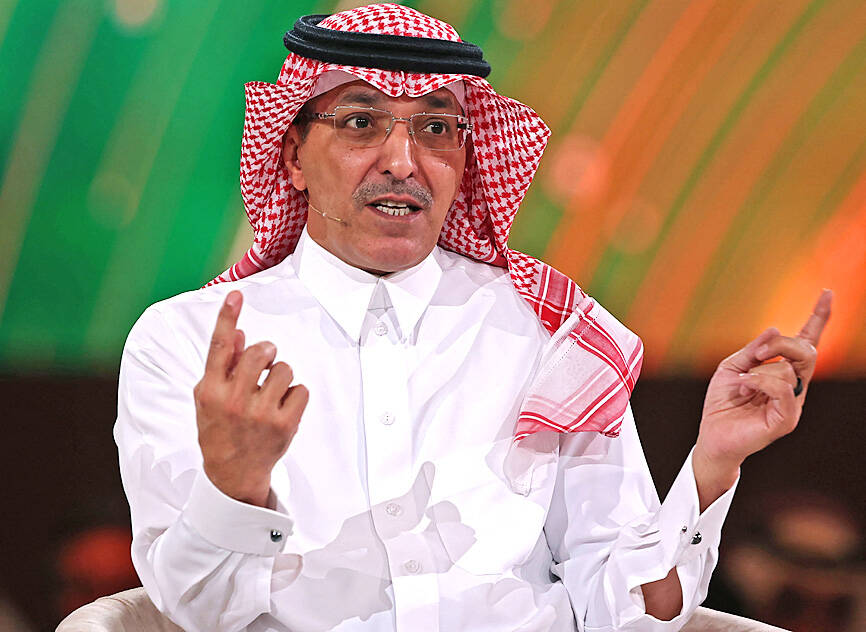Saudi Arabia plans to provide Pakistan with financial support, Saudi Minister of Finance Mohammed al-Jadaan said, as the kingdom looks to help shore up alliances with countries struggling with the effects of rising inflation.
The Saudi Arabian government is to “continue to support Pakistan as much as we can,” al-Jadaan said at a news conference in Riyadh.
The kingdom has taken several steps to provide financial support to countries in the region as it looks to bolster allies and cement new relationships.

Photo: AFP
Earlier this month, it extended the term of a US$3 billion deposit to boost foreign currency reserves and help Pakistan overcome economic repercussions of the COVID-19 pandemic.
Saudi Arabia is also looking to make more investments in Egypt and is planning to initiate deals in Turkey, al-Jadaan said.
“Our relationship with Turkey is improving greatly, and we hope to have investment opportunities,” he said. “We have started investing aggressively in Egypt and we will continue to look at investment opportunities and that is more important than deposits. Deposits can be pulled, but investments stay.”
Saudi Arabia is in the final stages of agreeing to deposit US$5 billion at Turkey’s central bank, the finance ministry said last month, a major boost for Turkish President Recep Tayyip Erdogan’s bid to keep the country’s currency stable ahead of presidential elections next year.
The agreement would crown a recent rapprochement that ended years of hostility between the Turkish and Saudi Arabian governments.
It also extended the maturity of a US$5 billion deposit with Egypt’s central bank last month, and the kingdom’s Public Investment Fund is also looking into US$10 billion of potential investments in Egypt’s healthcare, education, agriculture and financial sectors, the Egyptian Cabinet said in a statement.
The momentum of talks between the countries’ central banks comes after a joint effort by Saudia Arabia and Turkey to mend ties that were ruptured after the murder of Saudi Arabian journalist Jamal Khashoggi in 2018 at the kingdom’s Istanbul consulate.
Additional reporting by Reuters

PRECARIOUS RELATIONS: Commentators in Saudi Arabia accuse the UAE of growing too bold, backing forces at odds with Saudi interests in various conflicts A Saudi Arabian media campaign targeting the United Arab Emirates (UAE) has deepened the Gulf’s worst row in years, stoking fears of a damaging fall-out in the financial heart of the Middle East. Fiery accusations of rights abuses and betrayal have circulated for weeks in state-run and social media after a brief conflict in Yemen, where Saudi airstrikes quelled an offensive by UAE-backed separatists. The United Arab Emirates is “investing in chaos and supporting secessionists” from Libya to Yemen and the Horn of Africa, Saudi Arabia’s al-Ekhbariya TV charged in a report this week. Such invective has been unheard of

US President Donald Trump on Saturday warned Canada that if it concludes a trade deal with China, he would impose a 100 percent tariff on all goods coming over the border. Relations between the US and its northern neighbor have been rocky since Trump returned to the White House a year ago, with spats over trade and Canadian Prime Minister Mark Carney decrying a “rupture” in the US-led global order. During a visit to Beijing earlier this month, Carney hailed a “new strategic partnership” with China that resulted in a “preliminary, but landmark trade agreement” to reduce tariffs — but

Chinese President Xi Jinping’s (習近平) purge of his most senior general is driven by his effort to both secure “total control” of his military and root out corruption, US Ambassador to China David Perdue said told Bloomberg Television yesterday. The probe into Zhang Youxia (張又俠), Xi’s second-in-command, announced over the weekend, is a “major development,” Perdue said, citing the family connections the vice chair of China’s apex military commission has with Xi. Chinese authorities said Zhang was being investigated for suspected serious discipline and law violations, without disclosing further details. “I take him at his word that there’s a corruption effort under

China executed 11 people linked to Myanmar criminal gangs, including “key members” of telecom scam operations, state media reported yesterday, as Beijing toughens its response to the sprawling, transnational industry. Fraud compounds where scammers lure Internet users into fake romantic relationships and cryptocurrency investments have flourished across Southeast Asia, including in Myanmar. Initially largely targeting Chinese speakers, the criminal groups behind the compounds have expanded operations into multiple languages to steal from victims around the world. Those conducting the scams are sometimes willing con artists, and other times trafficked foreign nationals forced to work. In the past few years, Beijing has stepped up cooperation